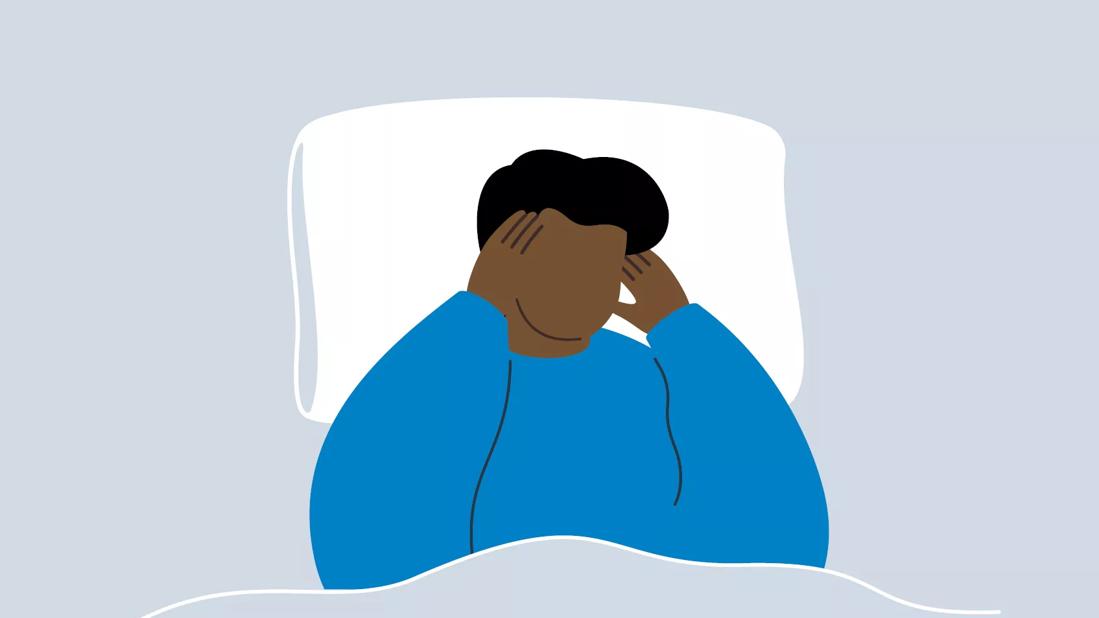An expert explores the potential connections

Image content: This image is available to view online.
View image online (https://assets.clevelandclinic.org/transform/4f0a3f9f-9efe-45a0-bd9d-d4306c2332a3/MelatoninAndHeadaches-1349230831-770x533-1_jpg)
An illustration of a person laying in bed and holding their head in pain
When we think about the sleep hormone melatonin, it’s often in relation to getting more sleep or better sleep. But making sure you take the right dose can be tricky. Take too little, and you don’t see a difference; take too much, and you could experience some side effects, including headaches.
Advertisement
Cleveland Clinic is a non-profit academic medical center. Advertising on our site helps support our mission. We do not endorse non-Cleveland Clinic products or services. Policy
To better understand if melatonin can really induce headaches and how you can avoid this, we spoke to sleep specialist Marri Horvat, MD, MS.
The actual reason that melatonin seems to trigger headaches isn’t directly known, says Dr. Horvat, but there are some possibilities that explain the connection.
Like a lot of supplements available over-the-counter, the melatonin that you buy off the shelf at your local drugstore isn’t well-regulated by the U.S. Food and Drug Administration (FDA). “Because it’s considered a dietary supplement and there’s less strict regulation, the actual amount of melatonin can vary from product to product with no way of knowing that actual content,” explains Dr. Horvat.
While this means the actual melatonin content could be below what a product claims, it also means it could be well above what the label claims, and that could lead to side effects. A 2017 study from the Journal of Clinical Sleep Medicine showed melatonin content found across 31 supplements ranged from 83% less than advertised to a whopping 478% more than advertised.
Additionally, Dr. Horvat says there could be other supplements like serotonin or valerian mixed in, which could prompt a reaction.
Advertisement
Ironically, it could be that headaches triggered by melatonin could be due to a disrupted sleep cycle. “By using melatonin, you could be changing your natural sleep-wake cycle,” notes Dr. Horvat, “and that itself can induce headaches.”
Yes, while melatonin can potentially trigger headaches, it’s also used to treat them. “Studies have shown that certain amounts of melatonin were effective in treating migraines even though it’s unclear if that has to do with the melatonin itself or improved sleep,” she says.
That said, it shouldn’t be considered a first-line treatment for migraines or other headaches. “You should contact your healthcare provider first to pinpoint the reason you’re having these headaches,” Dr. Horvat adds. “It could also mean that you have another condition that needs simultaneous treatment.”
Dr. Horvat reiterates that it’s best to consult with your doctor before taking any supplement or over-the-counter solution for sleep aids or long-term headache treatment. “If it’s a headache that doesn’t happen frequently, trying something like Tylenol® or ibuprofen is fine, depending on your health situation,” she says.
But if headaches are disrupting your sleep, disrupting your ability to function during the day or occurring at least three times a week, there are other options. “We can start daily medications that can relieve headache and some even aid sleep as a side effect,” Dr. Horvat adds, “but it depends on the type of migraine and how often it happens.”
By consulting with your doctor and any recommended specialist, it’ll be easier to find the treatment that’s right for you without subjecting you to unnecessary risks and side effects.
Advertisement

Sign up for our Health Essentials emails for expert guidance on nutrition, fitness, sleep, skin care and more.
Learn more about our editorial process.
Advertisement
Tart cherry juice contains natural compounds that may support better sleep
Melatonin won’t stop birth control from doing its job, but the combo could cause unwanted side effects
This sleep supplement may have side effects, but dependency isn’t one
Too much of the supplement can lead to an upset stomach, vomiting and diarrhea
This hormone helps your body prepare for sleep
Does this supplement help you get more ZZZs?
What to expect after taking this increasingly popular sleep aid
The short answer from a sleep specialist
Although it could be used as a moisturizer, this new trend is not recommended
Communicating clear limits helps protect your time, energy and emotional well-being
High cholesterol can be genetic, but testing and treatment can lower your heart disease risk